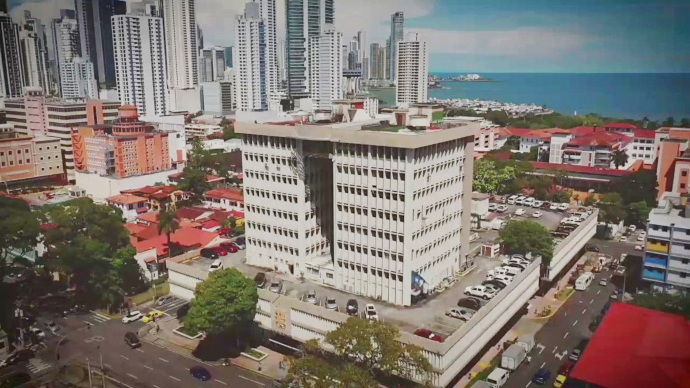Today in Panama the state isn’t based on the municipality, as it was in Title IX of the 1946 Constitution. The Edificio Hatillo, Panama City’s city hall these days. Photo by the Alcaldia.
Another thing about corregimientos vs. municipios
by Miguel Antonio Bernal V. — miguelantonio.bernal@gmail.com
I was ending my previous article, emphasizing that: “Effective participation in society to the point of becoming citizens — that is, full members of a political community — passes through the remunicipalization of the Panamanian state.”
The municipal regime in its long historical evolution has played a determining role in the democratization of institutions. Particularly so in reference to the necessary citizen participation.
The creation of different citizen participation mechanisms has been, since the 80s and 90s, one of the great evolutions in Latin American cities. In the struggles to advance democracy and in the objective of creating a “pervasive democracy”, in the cities of Lima (Peru), Fortaleza (Brazil), Montevideo (Uruguay) and Caracas (Venezuela), the local participation of citizens reached a much higher level. “Participatory processes had to be inclusive and deliberative in order to stimulate a cultural change that would allow city dwellers to become true citizens” (B.Goldfrank, Icaria-Barcelona 2004).
The aim was to return to the roots of the municipalities through citizen participation with citizen assemblies, councils and other popular participation mechanisms.
Luis Villar Borda tells us: “It would be a mistake to think that, within the conception of the modern state, absolute sovereignties could exist outside that of the state itself, but this does not lead to the conclusion that the political-administrative entities and, especially the municipality, they should simply be dependent or subordinate to the central power. First, because they are also an expression of the state or, in other words, organs of local power.
It should not be understood as the state, the central authority, and within it the executive power, as fascism does. And secondly, because there is no reason why municipal autonomy, understood within the framework of the law, necessarily comes into conflict with the powers of the central or regional power, when the ideal is to seek coordination between these different levels of power. (Municipal Democracy, Autonomy, Planning and Development, Institute of Local Administration Studies, Madrid, Spain, 1984.) Emphasis is mine.
Today in Panama, the state is not based upon the Municipality, as in Title IX of the 1946 Constitution, but in the corregimiento, something arbitrary of political convenience. It distorts citizen representation and participation. It sets us farther away from being able to achieve the necessary redemocratization and re-institutionalization that we urgently require.
Contact us by email at fund4thepanamanews@gmail.com
To fend off hackers, organized trolls and other online vandalism, our website comments feature is switched off. Instead, come to our Facebook page to join in the discussion.
These links are interactive — click on the boxes












